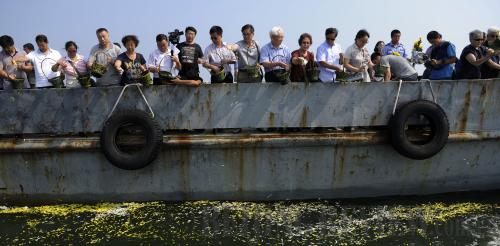|
 |
|
NEVER FORGOTTEN: Descendants of Chinese soldiers killed in the Jiawu War spread flowers onto the Dadonggou area of the Yellow Sea, the main battlefield during the war, on July 29 near Dandong, northeast China's Liaoning Province (CFP) |
The war also played a decisive role in the collapse of the Qing Dynasty and the rise of Japan as an Asian power, according to Dai Yi, a professor with Beijing-based Renmin University of China.
"The war reduced China to a prey of Western powers and placed Japan on a fast track to becoming a modern power, especially with the huge war indemnities from China," Dai said.
On April 17, 1895, China and Japan signed the Treaty of Shimonoseki. In the treaty, China recognized the full and complete independence and autonomy of Korea—a stipulation that actually made Korea more susceptible to Japanese influence. The Qing government also promised to pay Japan 200 million taels (approximately worth $5.3 billion today) in war indemnities and ceded the Liaodong Peninsula, Taiwan and the Penghu Islands.
It also complied with the opening of four more treaty ports, including Suzhou in Jiangsu Province, Hangzhou in Zhejiang Province, Shashi in Hubei Province and Chongqing in the upper reaches of the Yangtze River. China also had to give Japanese nationals the right to open factories and engage in industry and manufacturing in China.
"Winning the war made the Japanese more confident in the country's military superiority. It misled Japan in believing that war and aggression can yield wealth and resources, which put it on a self-destructive path of militarism," Dai said.
The aftermath
The defeat of China in the Jiawu War altered the fate of China under the Qing Dynasty. "The defeat changed how China was viewed in both the East and the West. The perception of Chinese weakness led to far more aggressive intrusions by foreign powers," said Paine. Starting from 1897, the imperial powers, including Germany, Russia, Britain, Japan and France, cut China up between them.
However, Zong suggested that there was a silver lining to the defeat. "It was from the war that a true revival movement began, which led to the Hundred Day's Reform in 1898, the National Revolution in 1911 that overthrew the Qing government, the May Fourth Movement in 1919, and ultimately the establishment of the People's Republic of China in 1949," Zong said.
"We should realize it was the First Sino-Japanese War that opened the door for the Chinese people to rise to seek the real modernization step by step," said Ma Yong, another researcher with the CASS' Institute of Modern History.
He said the history also has modern-day applications, as China's leadership is now emphasizing both reform and a new focus on the country's development.
"All the implications of history can be boiled down to one sentence: We must build China into a real modern and civilized society, being respected by other countries," Ma said.
Email us at: yinpumin@bjreview.com
Major Events of the Jiawu War of 1894-95:
July 25, 1894: Japanese warships attack two Chinese vessels near the Korean port of Asan
July 29, 1894: The field armies of the Qing Dynasty and Japan engage on land at Songhwan. The battle ends with a Japanese victory the next day
August 1, 1894: China and Japan officially declare war
September 16, 1894: The Qing army is defeated in Pyongyang and retreats to the Chinese side of the Yalu River
September 17, 1894: The Beiyang Fleet is defeated by the Japanese Grand Fleet in the Battle of the Yalu River
November 21, 1894: The Second Army of Japan conquers Lushun, sometimes known as Port Arthur, in northeast China and commits the Port Arthur Massacre
February 2, 1895: The Japanese army captures the port of Weihai in east China's Shandong Province
February 12, 1895: The Beiyang Fleet surrenders to the Japanese in Weihai
March 30, 1895: Armistice is reached between the Qing Dynasty and Japan
April 17, 1895: The Treaty of Shimonoseki is signed between the two countries. The war ends.
( Compiled by Beijing Review) | 